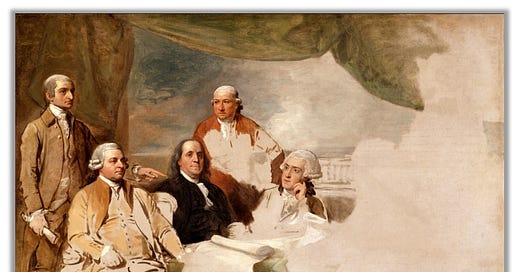TDIH: Brokering Peace with Britain
What if George III refused to accept the Surrender at Yorktown?
On this day in 1783, Congress declares a cessation of hostilities against Great Britain. It was just one of many steps in the long, hard road to negotiate a peace between Britain and America after the Revolution. We all hear about George Washington’s victory at Yorktown. But we hear much less about the two years that followed.
We weren’t really at war anymore. But we weren’t really at peace, either.
You may recall that the American victory at Yorktown occurred on October 19, 1781. Peace talks did not begin for many months after Cornwallis’s surrender. Americans hoped the surrender would be respected, but what if George III refused to accept it?
American and British representatives didn’t meet to begin the process of negotiating a treaty until April 1782. A preliminary peace treaty was signed by British and American representatives in Paris in November 1782. That preliminary treaty finally reached American shores in March 1783.
Despite this long prelude, Congress acted quickly. It declared a cessation of hostilities on April 11. A few days later, it approved the preliminary articles of peace. George Washington received word of these actions, and he had the cessation of hostilities formally declared in his camp on April 19.
It had been exactly 8 years, to the day, since the “shot heard round the world” at the Battles of Lexington and Concord.
Yet, even then, the peace still was not final. Several months later, the official Treaty of Paris was (finally) signed. Congress approved that Treaty in January 1784.
Throughout this time, George Washington faced a bit of a challenge: The army could not be disbanded. What if the peace fell through and they were needed again? On the other hand, the soldiers were restless and worried about whether they would get paid. Washington somehow, amazingly, managed to hold his army together throughout 1782. He ran drills and kept his men organized, even though the soldiers had no official purpose—except to wait and see if they were needed.
Throughout this long two-year period, Washington stayed with his Army. You have to wonder how often he simply wanted to go home. But he had to have known that the army would fall into disarray and/or revolt without him. Indeed, in March 1783, when the Newburgh Conspiracy cropped up, only Washington’s presence saved the day.
In October 1782, Washington wrote: “The patience, the fortitude, the long, & great sufferings of this Army is unexampled in history; but there is an end to all things, & I fear we are very near one to this. Which, more than probably, will oblige me to stick very close to my flock this Winter, & try like a careful physicion, to prevent, if possible, the disorder’s getting to an incurable height.”
Washington would finally be able to resign and return home to Mt. Vernon at the end of 1783. He had been away for more than 8 years, with only a few brief exceptions before and after Yorktown.
He made it home just in time for Christmas that year.
P.S. The attached picture was supposed to be of the commissioners who negotiated the peace treaty, except the British commissioners refused to pose. The portrait was never finished.
Sources can always be found on my website, here.





Washington stayed with his army. He wanted to go home, but he knew he needed to be with his army. He had a great care and personal interest in his men. What a difference he made in the outcome. Wouldn’t it be great if we had leaders like him today?
Nowadays, someone wouldn't accept the terms because of disagreements in the spelling!